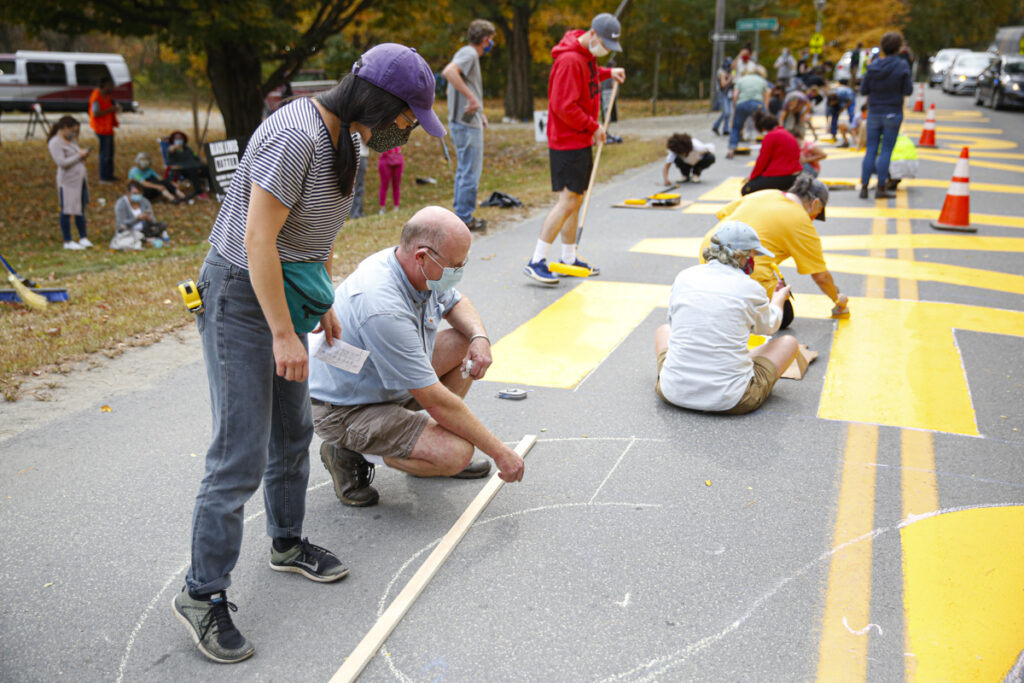Just over one year ago, Housing Trust board and staff members attended a special diversity training session that would serve as a springboard into the organization’s new REDI initiative. Facilitated by Brattleboro-based Equity Solutions, this first convening sparked a deeper awareness of the racial inequities and disparities that exist within our culture, policies, and state, and provided an opportunity to begin an open and honest dialogue. It was, by all accounts, enlightening, energizing and empowering. And so began the journey.

As the Covid-19 pandemic paralyzed the world, people of color were among the hardest hit. Race in America would become the central focus of our national conversation. Outrage over George Floyd’s death at the hands of police amplified the Black Lives Matter movement, and prompted urgent calls for racial justice and restorative action. Protests erupted in cities across the country. White supremacy was in the mainstream and on the rise. Debate raged over confederate flags and monuments. No matter where you turned, race was a factor. America became increasingly aware it was in the midst of a racial reckoning.
With all of this chaos and unrest serving as a backdrop, the committee charged with advancing the REDI initiative pressed on. They wanted to get a clear picture of how the organization was performing in terms of addressing equity, and how residents were feeling. Working again with Equity Solutions, the team commissioned a survey among residents and homeowners within the WWHT community. The goal was to learn about people’s positive and negative experiences around issues of inclusion and belonging.
“It took a little time to regroup after Covid shut everything down,” says Marion Major, who handles outreach for WWHT and serves as one of the REDI committee’s co-chairs. “But as soon as we could we dug into the work. It became even more of a priority framed by the global pandemic and the highly visible racial injustices continuing through 2020. The survey represents a huge part of the work that’s been done this past year.”
“This all came about at the same time all of the staff had their own lives impacted,” adds Ellen Snyder, resident board member and REDI committee co-chair. “They have been phenomenal. There really is a level of maturity and generosity among the staff to be transparent, supportive, inclusive. The REDI initiative comes into an organization that already does a lot.”
Davey Shlasko of Equity Solutions facilitated the survey process for WWHT. “This organization was thinking ahead, being proactive,” says Shlasko. “Initially we were training their REDI committee. In 2020, we decided to shift gears. A survey like this – it’s not the usual place for organizations to start the process. They are really doing some brave and bold steps.”
Because surveys can only reveal so much, Shlasko also did some follow up through focus groups and one-on-one interviews. He has reported his findings to the committee along with a list of recommendations addressing areas of opportunity. Although survey respondents reported mostly positive experiences with WWHT, Shlasko says that doesn’t necessarily mean everything is rosy. “Some of the most important information we can glean from this assessment is about which residents report what kinds of positive and negative responses.”
“We want to start fostering the need for more residents to participate, to speak up and share their perspective. It’s important to pay attention to the people who are unhappy, and find out why.”
– Ellen Snyder, Resident Board Member and REDI Committee Co-Chair
“When a sample of people say they don’t notice any examples of harassment, that doesn’t mean everything’s fine,” says Ellen Snyder. “We want to start fostering the need for more residents to participate, to speak up and share their perspective. It’s important to pay attention to the people who are unhappy, and find out why.”
“When I delivered my report, folks were really interested — they brought all their curiosity, and were really engaged,” says Davey. “This process really is about taking risks and trying things out. A lot of times, where white folks can get stuck is, they don’t know the perfect thing to do. The answer is almost always, something is better than nothing, and first steps allow next steps.”
The REDI committee is now working on a deep dive into Shlasko’s report, identifying priorities, determining strategy, and planning how best to share the findings with their community. Shlasko says that one of WWHT’s greatest assets is its residents. His top recommendation involves forming a formal body of resident leaders, to get involved with governance, and resolving issues that come up at the community level – issues that staff are not always equipped to handle. “There is a lot of energy there, and interest, and skills ready to be drawn on,” he says. “Building collaborative relationships with the residents who want to contribute to positive change will make everything else possible.”
“One thing that surprised me– in a good way – is the organizational power dynamics that exist within WWHT, and how completely they are embracing this process. At other organizations, the people in power will try to preserve their power – they would be hesitant to share information from an assessment like this. Not WWHT. They have already started bringing this report to community meetings.”
“Equity Solutions did a great job of integrating hard data charts and graphs with helpful narrative,” says Marion. “Now we are taking it step by step. We want to really intentionally figure out how to implement these recommendations, as well as the best way to share the report with the people who were part of it. We’re diving into a strategic planning year, so the timing is perfect. It’s a huge subject, and massively important work that is so past due. “
Equity Solutions is now closed — another business impacted by Covid – however, Davey continues to work with clients through his company, Think Again Training and Consulting. Although this phase of the process is complete, he says the work isn’t over, and he encourages donors and supporters of WWHT to ask questions and help keep the initiative moving forward.




